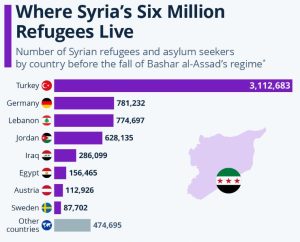What next for the Syrian diaspora?
The UN refugee agency UNHCR has called on countries to reverse a decision to pause the processing Syrians’ asylum claims.
Many nations, including most European countries, have paused asylum claims by Syrians after the fall of the Bashar Al-Assad Regime.
“Amid the fluidity of the current situation, individual circumstances will vary, including the drivers of displacement. While thousands have already returned, hundreds of thousands of others are fleeing for their lives inside the country. Both need protection and support,” UNHCR said in a statement.
“Those fleeing violence and persecution have a right to seek safety and the right to seek asylum. It is therefore critical that Syrians who are compelled to flee the country are given access to territory – anyone seeking international protection must be able to access asylum procedures and have their application examined fully and individually on its merits, in accordance with appropriate, procedural safeguards.
“The situation is rapidly changing and displacement dynamics continue both within the country and across borders, in a context that has produced one of the world’s largest displacement situations,” UNHCR said.
The lightning offensive by an alliance of Syrian rebel groups that led to the fall of the brutal al-Assad’s regime has triggered hope among the Syrian diaspora.
 Around six million have sought refuge outside their borders since the start of the civil war in 2011.
Around six million have sought refuge outside their borders since the start of the civil war in 2011.
In Turkey, which currently hosting more than three million Syrian refugees according to the office of the United Nations High Commissioner for Refugees (UNHCR), there were scenes of joy after the end of five decades of bloody dictatorship.
Hundreds of Syrian refugees have already made their way to the Turkish border crossings of Cilvegozu and Oncupinar, as well as to the Masnaa border crossing between Lebanon and Syria.
While the fall of the Assad dictatorship has restored a little hope to the Syrian people, the living conditions of refugees in neighbouring countries are also contributing to the wave of returns.
In Lebanon, where more than 770,000 Syrians are registered with the UNHCR, the vast majority are living in extremely difficult conditions, worsened by an enduring economic crisis and the conflict between Israel and Hezbollah.
Also, a return to their homeland and the political transition underway are fraught with difficulties for Syrians.
Syria is in the throes of new power dynamics, with various factions currently controlling different regions of the country.
Added to this is the uncertainty surrounding the policies of the new ruling order led by Abu Mohammed al-Joulani, founder and leader of the alliance of rebel groups.
The UNHCR has said “a peaceful transition is essential to enable refugees to return home safely”.
So where have the six million Syrians who fled found refuge?
According to UNHCR, Turkey has been hosting 3.1 million Syrians, Germany 780,000, Lebanon 775,000, Jordan 628,000, Iraq 286,000, Egypt 156,000, Austria 1132,000, Sweden 88,000, and there are 475,000 Syrians in other countries.












